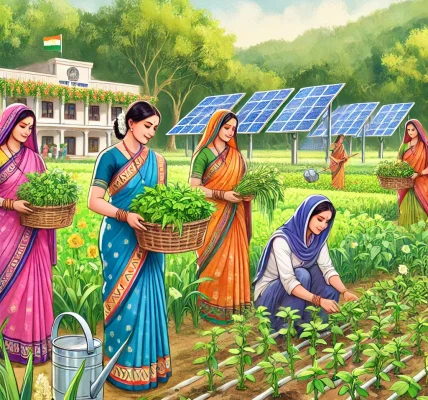Introduction
Organic farming is gaining momentum in India due to its sustainable approach and long-term benefits for both farmers and consumers. The government has introduced several schemes to support organic farming, offering financial assistance, technical support, and marketing aid. These initiatives aim to reduce dependence on chemical fertilizers and pesticides while promoting eco-friendly agricultural practices.
In this article, we will explore the top government schemes that support organic farming in India and how farmers can benefit from them.
1. Paramparagat Krishi Vikas Yojana (PKVY)
Overview
Launched under the National Mission for Sustainable Agriculture (NMSA), Paramparagat Krishi Vikas Yojana (PKVY) is one of the key initiatives promoting organic farming in India.
Benefits
- Financial assistance of ₹50,000 per hectare for three years.
- Encourages cluster-based organic farming (50 farmers per cluster, 50 hectares of land).
- Support for organic certification and branding of organic produce.
- Training for farmers in sustainable practices like composting and bio-fertilizers.
Eligibility
- Small and marginal farmers can apply.
- Farmers must form clusters for collective participation.
How to Apply
- Visit the official website: https://pgsindia-ncof.gov.in
- Contact the nearest Krishi Vigyan Kendra (KVK) or Agricultural Officer.
2. National Programme for Organic Production (NPOP)
Overview
The National Programme for Organic Production (NPOP) is a certification scheme implemented by the Agricultural and Processed Food Products Export Development Authority (APEDA).
Benefits
- Provides organic certification for farmers and exporters.
- Facilitates export of organic produce by meeting international standards.
- Offers support for organic farming research and development.
- Farmers get assistance for participatory guarantee systems (PGS) for group certification.
Eligibility
- Farmers, producer groups, cooperatives, and companies involved in organic farming.
How to Apply
- Register through APEDA’s online portal: https://apeda.gov.in
- Contact certification bodies accredited by NPOP.
3. Rashtriya Krishi Vikas Yojana (RKVY)
Overview
The Rashtriya Krishi Vikas Yojana (RKVY) is a centrally sponsored scheme aimed at ensuring holistic agricultural development, including organic farming.
Benefits
- Funding for organic input production (bio-fertilizers, compost units, vermicompost units).
- Grants for setting up organic markets and value chains.
- Support for training programs in organic farming.
- Encourages research and innovation in organic agriculture.
Eligibility
- Individual farmers, FPOs (Farmer Producer Organizations), cooperatives, and NGOs.
How to Apply
- Apply through the State Agriculture Department.
- Visit the official website: https://rkvy.nic.in
4. Mission Organic Value Chain Development for North Eastern Region (MOVCDNER)
Overview
The MOVCDNER is designed specifically for the North-Eastern states, aiming to develop organic farming value chains.
Benefits
- Financial assistance of ₹10,000 per hectare for organic certification.
- Support for organic input production.
- Assistance for market linkages and branding.
- Encourages Farmer Producer Companies (FPCs) to boost collective farming.
Eligibility
- Farmers from North-Eastern states.
- Farmer groups, cooperatives, and start-ups in organic farming.
How to Apply
- Apply through State Agricultural Departments in North-East states.
- More details available at https://agricoop.nic.in
5. State-Specific Organic Farming Schemes
Overview
Several states have their own organic farming policies and subsidies, such as:
- Madhya Pradesh Organic Farming Policy
- Sikkim Organic Mission (SOM) – Sikkim is India’s first fully organic state.
- Tamil Nadu Organic Farming Policy
- Uttarakhand Organic Commodity Board (UOCB)
Benefits
- Special financial aid for organic farmers.
- Support for marketing organic produce in national and international markets.
- Assistance for organic certification.
How to Apply
- Visit the respective state agriculture department’s official website.
How Farmers Can Apply for Organic Farming Schemes
Step 1: Identify the Right Scheme
Farmers should analyze which scheme best fits their needs based on their location, crop type, and available funding.
Step 2: Prepare Necessary Documents
Commonly required documents include:
- Aadhar Card or other identity proof.
- Land ownership records.
- Bank account details.
- Proof of organic farming (if applying for certification).
Step 3: Submit Application
- Many schemes offer online application portals.
- Farmers can also apply through Krishi Vigyan Kendras (KVKs) or state agricultural departments.
Step 4: Follow Up
- Regularly check the application status on the respective portal.
- Respond to any additional document requests.
- Maintain compliance with guidelines to receive full benefits.
Legal Disclaimer & Precautions
To ensure a smooth process and avoid fraudulent schemes:
- Apply only through official government portals.
- Do not pay unauthorized agents for subsidy approval.
- Keep a record of all submitted documents.
- Verify scheme details from government websites before applying.
Conclusion
Government schemes play a crucial role in promoting organic farming in India by providing financial aid, training, and market access. Farmers should take advantage of these initiatives to improve productivity, reduce costs, and enhance the sustainability of their agricultural practices.




